地道英语:常用的形容词口语短句
- 格式:docx
- 大小:125.27 KB
- 文档页数:5
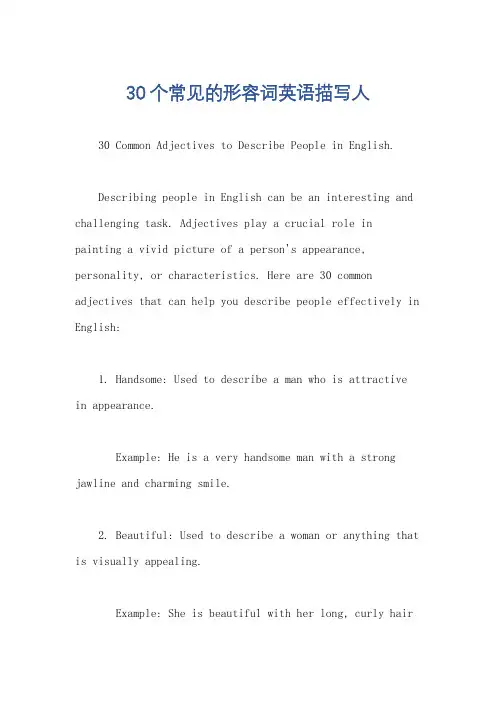
30个常见的形容词英语描写人30 Common Adjectives to Describe People in English.Describing people in English can be an interesting and challenging task. Adjectives play a crucial role inpainting a vivid picture of a person's appearance, personality, or characteristics. Here are 30 common adjectives that can help you describe people effectively in English:1. Handsome: Used to describe a man who is attractivein appearance.Example: He is a very handsome man with a strong jawline and charming smile.2. Beautiful: Used to describe a woman or anything that is visually appealing.Example: She is beautiful with her long, curly hairand sparkling eyes.3. Talented: Describes someone who has special skills or abilities.Example: He is a talented musician who can play several instruments.4. Intelligent: Describes someone who is clever and hasa high IQ.Example: She is an intelligent woman who alwaysfinds innovative solutions to problems.5. Friendly: Describes someone who is kind and easy to get along with.Example: He is a friendly person who always greets his neighbors with a smile.6. Outgoing: Describes someone who is extroverted and enjoys socializing.Example: She is an outgoing person who loves to attend parties and meet new people.7. Shy: Describes someone who is reserved and tends to be uncomfortable in social settings.Example: He is a shy boy who finds it difficult to speak in public.8. Patient: Describes someone who has a calm temperament and is willing to wait or endure.Example: She is a patient teacher who never loses her temper with her students.9. Ambitious: Describes someone who is driven and determined to succeed.Example: He is an ambitious entrepreneur who always has big plans for his business.10. Loyal: Describes someone who is faithful and trustworthy.Example: She is a loyal friend who would never betray her best friend's trust.11. Funny: Describes someone who has a good sense of humor and can make people laugh.Example: He is a funny guy who always knows how to break the ice with a joke.12. Serious: Describes someone who is solemn and takes life seriously.Example: She is a serious student who always completes her homework on time.13. Creative: Describes someone who is imaginative and can create original works.Example: He is a creative artist who creates uniquepaintings that captivate his audience.14. Confident: Describes someone who is sure of themselves and their abilities.Example: She is a confident speaker who never hesitates to voice her opinions.15. Optimistic: Describes someone who is hopeful and expects positive outcomes.Example: He is an optimistic person who always sees the bright side of life.16. Pessimistic: Describes someone who tends to be negative and see the worst in situations.Example: She is a pessimistic person who always expects the worst to happen.17. Brave: Describes someone who is courageous and not afraid to take risks.Example: He is a brave soldier who is not afraid to face danger.18. Generous: Describes someone who is kind and willing to share their wealth or possessions.Example: She is a generous person who always donates to charity.19. Stubborn: Describes someone who is resistant to change and holds onto their opinions stubbornly.Example: He is a stubborn man who refuses to listen to anyone else's opinion.20. Flexible: Describes someone who is adaptable and can easily change their plans or: opinions Describes. someone who is self-。
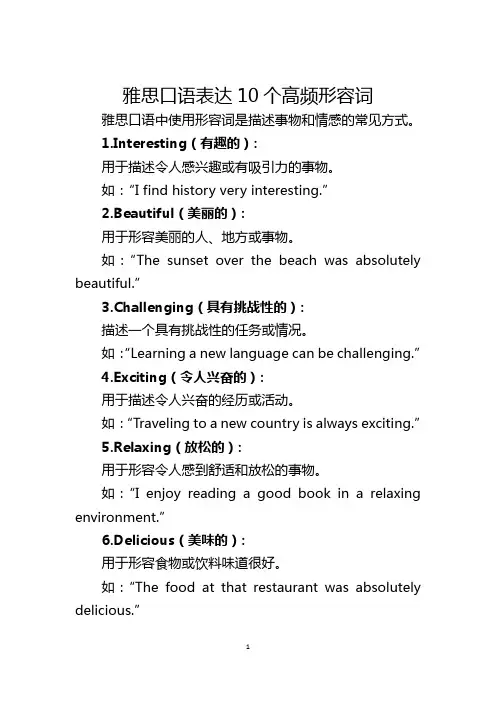
雅思口语表达10个高频形容词雅思口语中使用形容词是描述事物和情感的常见方式。
1.Interesting(有趣的):用于描述令人感兴趣或有吸引力的事物。
如:“I find history very interesting.”2.Beautiful(美丽的):用于形容美丽的人、地方或事物。
如:“The sunset over the beach was absolutely beautiful.”3.Challenging(具有挑战性的):描述一个具有挑战性的任务或情况。
如:“Learning a new language can be challenging.”4.Exciting(令人兴奋的):用于描述令人兴奋的经历或活动。
如:“Traveling to a new country is always exciting.”5.Relaxing(放松的):用于形容令人感到舒适和放松的事物。
如:“I enjoy reading a good book in a relaxing environment.”6.Delicious(美味的):用于形容食物或饮料味道很好。
如:“The food at that restaurant was absolutely delicious.”7.Astonishing(令人惊讶的):描述让人感到惊讶或震惊的事物,如:“The magician's tricks were astonishing.”8.Frustrating(令人沮丧的):描述令人感到沮丧、困惑或苦恼的情况,如:“I find dealing with technological issues very frustrating.”9.Memorable(难忘的):用于形容令人难以忘怀的经历或事件,如:“My trip to Paris was a memorable experience.”10.Inspiring(鼓舞人心的):描述令人感到鼓舞或受到激励的事物。
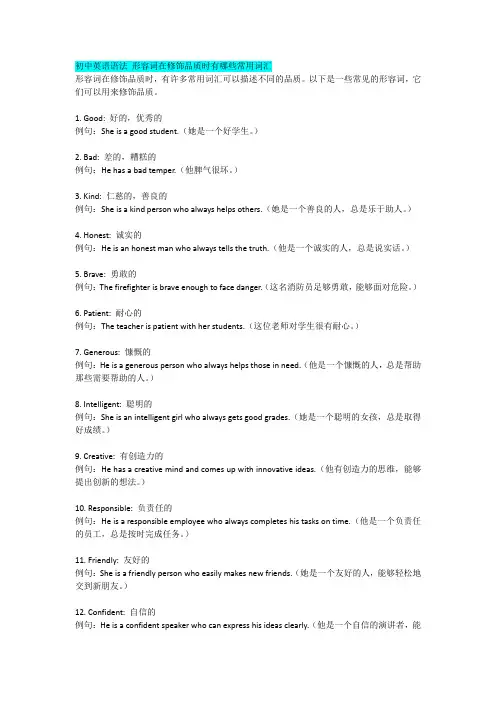
初中英语语法形容词在修饰品质时有哪些常用词汇形容词在修饰品质时,有许多常用词汇可以描述不同的品质。
以下是一些常见的形容词,它们可以用来修饰品质。
1. Good: 好的,优秀的例句:She is a good student.(她是一个好学生。
)2. Bad: 差的,糟糕的例句:He has a bad temper.(他脾气很坏。
)3. Kind: 仁慈的,善良的例句:She is a kind person who always helps others.(她是一个善良的人,总是乐于助人。
)4. Honest: 诚实的例句:He is an honest man who always tells the truth.(他是一个诚实的人,总是说实话。
)5. Brave: 勇敢的例句:The firefighter is brave enough to face danger.(这名消防员足够勇敢,能够面对危险。
)6. Patient: 耐心的例句:The teacher is patient with her students.(这位老师对学生很有耐心。
)7. Generous: 慷慨的例句:He is a generous person who always helps those in need.(他是一个慷慨的人,总是帮助那些需要帮助的人。
)8. Intelligent: 聪明的例句:She is an intelligent girl who always gets good grades.(她是一个聪明的女孩,总是取得好成绩。
)9. Creative: 有创造力的例句:He has a creative mind and comes up with innovative ideas.(他有创造力的思维,能够提出创新的想法。
)10. Responsible: 负责任的例句:He is a responsible employee who always completes his tasks on time.(他是一个负责任的员工,总是按时完成任务。
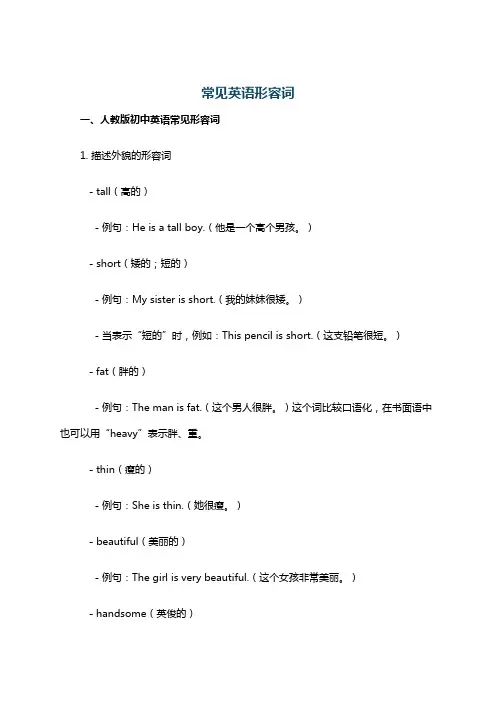
常见英语形容词一、人教版初中英语常见形容词1. 描述外貌的形容词- tall(高的)- 例句:He is a tall boy.(他是一个高个男孩。
)- short(矮的;短的)- 例句:My sister is short.(我的妹妹很矮。
)- 当表示“短的”时,例如:This pencil is short.(这支铅笔很短。
)- fat(胖的)- 例句:The man is fat.(这个男人很胖。
)这个词比较口语化,在书面语中也可以用“heavy”表示胖、重。
- thin(瘦的)- 例句:She is thin.(她很瘦。
)- beautiful(美丽的)- 例句:The girl is very beautiful.(这个女孩非常美丽。
)- handsome(英俊的)- 例句:My father is handsome.(我的爸爸很英俊。
)主要用于形容男性的外貌好看。
- ugly(丑陋的)- 例句:That monster is ugly.(那个怪物很丑陋。
)2. 描述性格的形容词- kind(和蔼的;善良的)- 例句:Miss Li is a kind teacher.(李老师是一位和蔼的老师。
)- friendly(友好的)- 例句:My classmates are friendly to me.(我的同学们对我很友好。
) - shy(害羞的)- 例句:The little girl is shy.(这个小女孩很害羞。
)- outgoing(外向的)- 例句:He is an outgoing boy.(他是一个外向的男孩。
)- quiet(安静的)- 例句:She is a quiet student.(她是一个安静的学生。
)- clever(聪明的)- 例句:The little boy is very clever.(这个小男孩非常聪明。
)- stupid(愚蠢的)- 例句:It's a stupid idea.(这是一个愚蠢的主意。
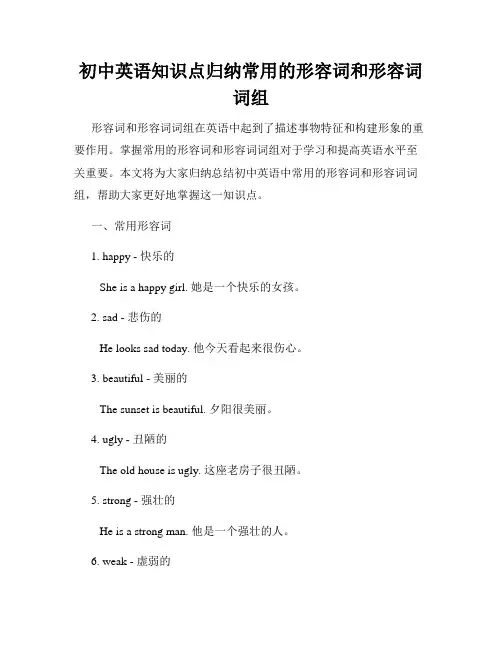
初中英语知识点归纳常用的形容词和形容词词组形容词和形容词词组在英语中起到了描述事物特征和构建形象的重要作用。
掌握常用的形容词和形容词词组对于学习和提高英语水平至关重要。
本文将为大家归纳总结初中英语中常用的形容词和形容词词组,帮助大家更好地掌握这一知识点。
一、常用形容词1. happy - 快乐的She is a happy girl. 她是一个快乐的女孩。
2. sad - 悲伤的He looks sad today. 他今天看起来很伤心。
3. beautiful - 美丽的The sunset is beautiful. 夕阳很美丽。
4. ugly - 丑陋的The old house is ugly. 这座老房子很丑陋。
5. strong - 强壮的He is a strong man. 他是一个强壮的人。
6. weak - 虚弱的The patient is very weak. 病人很虚弱。
7. tall - 高的He is taller than me. 他比我高。
8. short - 矮的She is shorter than her classmates. 她比同学们矮。
9. long - 长的They took a long walk in the park. 他们在公园里散了很长时间的步。
10. short - 短的The book is very short. 这本书很短。
11. big - 大的The elephant is big. 大象很大。
12. small - 小的The mouse is small. 小老鼠很小。
13. fast - 快的He runs very fast. 他跑得很快。
14. slow - 慢的The turtle is slow. 龟爬得很慢。
15. good - 好的She is a good student. 她是一个好学生。
16. bad - 坏的The weather is bad today. 今天天气很糟糕。
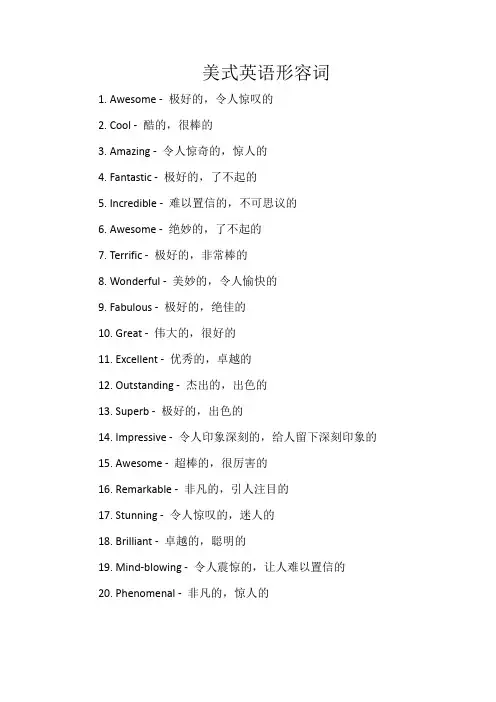
美式英语形容词
1. Awesome -极好的,令人惊叹的
2. Cool -酷的,很棒的
3. Amazing -令人惊奇的,惊人的
4. Fantastic -极好的,了不起的
5. Incredible -难以置信的,不可思议的
6. Awesome -绝妙的,了不起的
7. Terrific -极好的,非常棒的
8. Wonderful -美妙的,令人愉快的
9. Fabulous -极好的,绝佳的
10. Great -伟大的,很好的
11. Excellent -优秀的,卓越的
12. Outstanding -杰出的,出色的
13. Superb -极好的,出色的
14. Impressive -令人印象深刻的,给人留下深刻印象的
15. Awesome -超棒的,很厉害的
16. Remarkable -非凡的,引人注目的
17. Stunning -令人惊叹的,迷人的
18. Brilliant -卓越的,聪明的
19. Mind-blowing -令人震惊的,让人难以置信的
20. Phenomenal -非凡的,惊人的。
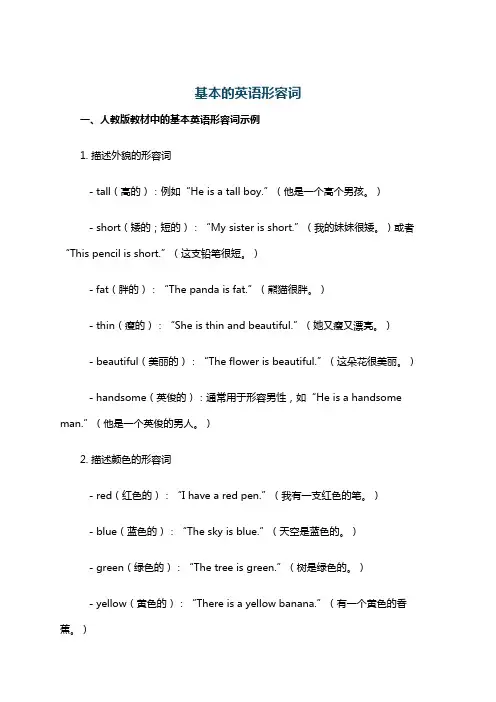
基本的英语形容词一、人教版教材中的基本英语形容词示例1. 描述外貌的形容词- tall(高的):例如“He is a tall boy.”(他是一个高个男孩。
)- short(矮的;短的):“My sister is short.”(我的妹妹很矮。
)或者“This pencil is short.”(这支铅笔很短。
)- fat(胖的):“The panda is fat.”(熊猫很胖。
)- thin(瘦的):“She is thin and beautiful.”(她又瘦又漂亮。
)- beautiful(美丽的):“The flower is beautiful.”(这朵花很美丽。
) - handsome(英俊的):通常用于形容男性,如“He is a handsome man.”(他是一个英俊的男人。
)2. 描述颜色的形容词- red(红色的):“I have a red pen.”(我有一支红色的笔。
)- blue(蓝色的):“The sky is blue.”(天空是蓝色的。
)- green(绿色的):“The tree is green.”(树是绿色的。
)- yellow(黄色的):“There is a yellow banana.”(有一个黄色的香蕉。
)- black(黑色的):“His hair is black.”(他的头发是黑色的。
)- white(白色的):“The snow is white.”(雪是白色的。
)3. 描述性质的形容词- big(大的):“The elephant is big.”(大象很大。
)- small(小的):“The mouse is small.”(老鼠很小。
)- new(新的):“I bought a new book.”(我买了一本新书。
)- old(旧的;老的):“This is an old car.”(这是一辆旧汽车。
)或者“My grandfather is old.”(我的爷爷很老了。
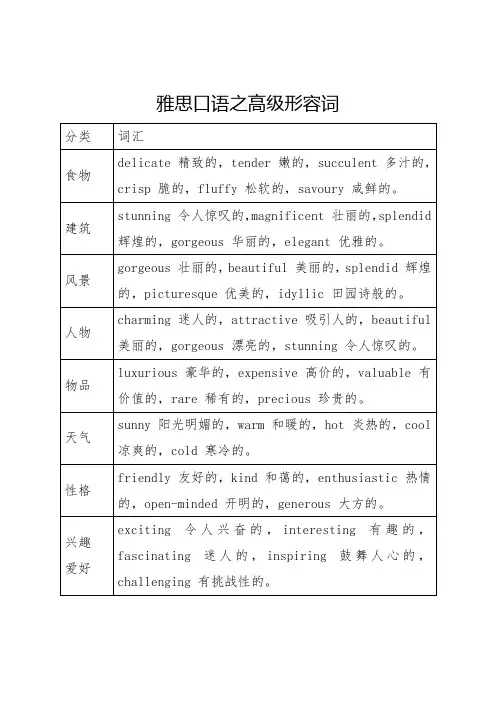
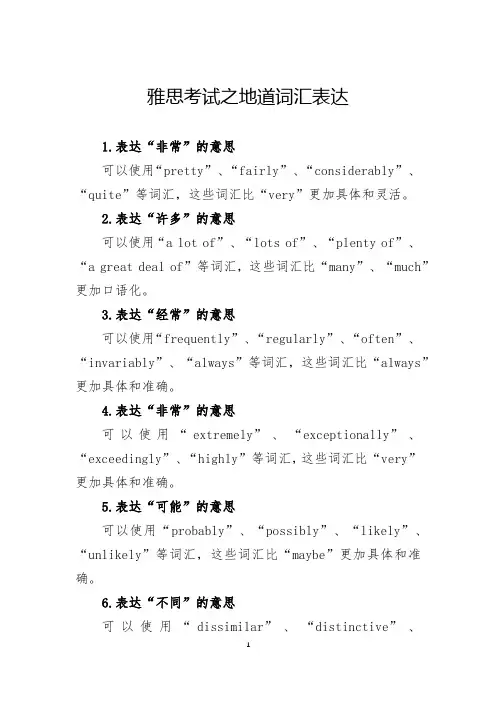
雅思考试之地道词汇表达1.表达“非常”的意思可以使用“pretty”、“fairly”、“considerably”、“quite”等词汇,这些词汇比“very”更加具体和灵活。
2.表达“许多”的意思可以使用“a lot of”、“lots of”、“plenty of”、“a great deal of”等词汇,这些词汇比“many”、“much”更加口语化。
3.表达“经常”的意思可以使用“frequently”、“regularly”、“often”、“invariably”、“always”等词汇,这些词汇比“always”更加具体和准确。
4.表达“非常”的意思可以使用“extremely”、“exceptionally”、“exceedingly”、“highly”等词汇,这些词汇比“very”更加具体和准确。
5.表达“可能”的意思可以使用“probably”、“possibly”、“likely”、“unlikely”等词汇,这些词汇比“maybe”更加具体和准确。
6.表达“不同”的意思可以使用“dissimilar”、“distinctive”、“unique”、“unusual”等词汇,这些词汇比“different”更加具体和准确。
7.表达“好”的意思可以使用“excellent”、“superb”、“outstanding”、“brilliant”、“gorgeous”等词汇,这些词汇比“good”更加具体和准确。
8.表达“但是”的意思可以使用“however”、“nevertheless”、“yet”等词汇,这些词汇比“but”更加正式和准确。
9.表达“在之后”的意思可以使用“subsequently”、“afterwards”、“later on”、“eventually”等词汇,这些词汇比“then”更加具体和准确。
10.表达“有很多事情要做”的意思可以使用“have a lot on my plate”或者“have my hands full”,这些表达比常规说法更加生动有趣。
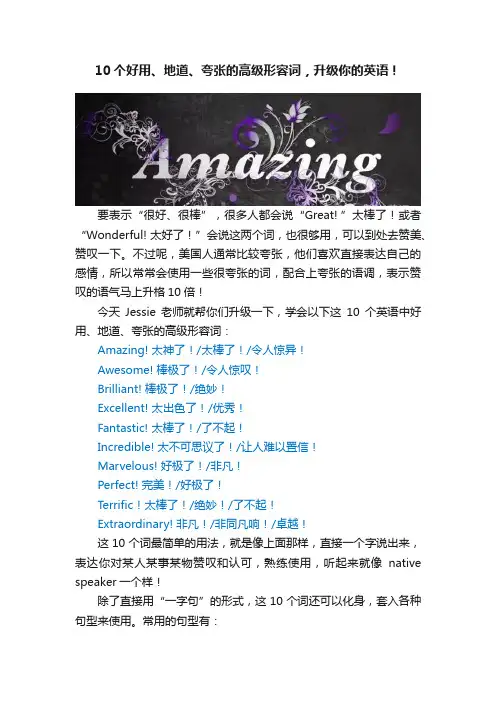
10个好用、地道、夸张的高级形容词,升级你的英语!要表示“很好、很棒”,很多人都会说“Great!”太棒了!或者“Wonderful!太好了!”会说这两个词,也很够用,可以到处去赞美、赞叹一下。
不过呢,美国人通常比较夸张,他们喜欢直接表达自己的感情,所以常常会使用一些很夸张的词,配合上夸张的语调,表示赞叹的语气马上升格10倍!今天Jessie老师就帮你们升级一下,学会以下这10个英语中好用、地道、夸张的高级形容词:Amazing! 太神了!/太棒了!/令人惊异!Awesome! 棒极了!/令人惊叹!Brilliant! 棒极了!/绝妙!Excellent! 太出色了!/优秀!Fantastic! 太棒了!/了不起!Incredible! 太不可思议了!/让人难以置信!Marvelous! 好极了!/非凡!Perfect! 完美!/好极了!Terrific!太棒了!/绝妙!/了不起!Extraordinary! 非凡!/非同凡响!/卓越!这10个词最简单的用法,就是像上面那样,直接一个字说出来,表达你对某人某事某物赞叹和认可,熟练使用,听起来就像native speaker一个样!除了直接用“一字句”的形式,这10个词还可以化身,套入各种句型来使用。
常用的句型有:“How/It’s/That’s/Sb. is/Sth. is +形容词”我们以amazing为例:表示赞叹,可以说:How amazing! 太神了!/太棒了!/太令人惊异了!赞美某件事或某样东西,可以说:It’s amazing! 太神了!/太棒了!That’s amazing! 这真是太神了!/这真是太棒了!赞美人,可以说:You’re amazing! 你真棒!/你真了不起!He’s amazing! 他真棒!/他真了不起!赞美具体的物、事或经历,可以说:This book is amazing! 这本书真是棒极了!The music is amazing! 音乐真是棒极了!Your performance is amazing! 你的演出真是太棒了!别忘了,举一而反三,其他9个词也可套入这些句型自如使用。
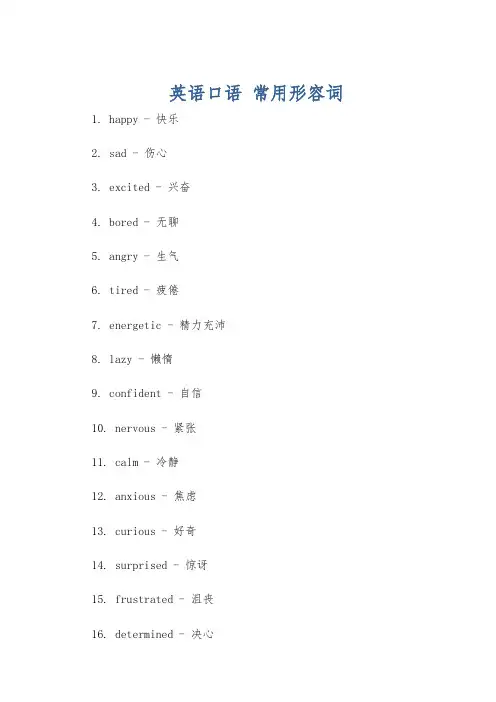
英语口语常用形容词1. happy - 快乐2. sad - 伤心3. excited - 兴奋4. bored - 无聊5. angry - 生气6. tired - 疲倦7. energetic - 精力充沛8. lazy - 懒惰9. confident - 自信10. nervous - 紧张11. calm - 冷静12. anxious - 焦虑13. curious - 好奇14. surprised - 惊讶15. frustrated - 沮丧16. determined - 决心17. grateful - 感激18. proud - 自豪19. embarrassed - 尴尬20. content - 满足1. How do you feel when you receive a surprise gift?2. 当你收到一个惊喜礼物的时候,你是什么感觉?3. I feel so happy and grateful when I receive a surprise gift.4. 当我收到一个惊喜礼物的时候,我感到非常快乐和感激。
5. How do you feel when you have to give a speech in front of a large audience?6. 当你要在大庭广众之前演讲时,你是什么感觉?7. I feel nervous and anxious when I have to give a speech in front of a large audience.8. 当我要在大庭广众之前演讲时,我感到紧张和焦虑。
300个“极常用”英语口语短句1. Have a nice day. 祝你今天愉快(通常在跟别人道别的时候说,类似于goodbye 了)2. So far, so good. 目前为止一切都好3. Take it or leave it. 要就要,不要就拉倒4. Keep it up! 继续努力,继续加油5. Good for you. 好啊!做得好!6. Time flies!时光如梭7. Time is money. 时间就是金钱8. That's life. 这就是人生9. Now you're talking. 这才对嘛(你这才叫说话!。
刚说的都是废话)10. I have butterflies in my stomach. 我感到紧张(老外的肚子的蝴蝶,类似于中国人所说的心里乱撞的小鹿)11. You asked for it. 你自找的12. read between the lines 读出字里行间的言外之意13. The rest is history. 其他的就众所皆知了14. A little bird told me. 我人听说的15. It never rains but it pours. 祸不单行(pour:倾盆大雨)16. Mind your own business. 不关你的事儿(管好你自己的事儿)17. Hang in there. 坚持下去stay with me18. could be worse 已经很好了(老外说话很婉转)19. Money talks. 金钱万能20. count me out 不要算我/ count me in算我一个21. Over my dead body! 想都别想(除非我死了)22. go fifty-fifty on sth. (在...上面)平分23. You can say that again! You said it! 你说的没错;你说对了24. Look who's talking! 看看你自己吧!25. It's Greek to me. 这我完全不懂(希腊文很难懂)26. take my word for it 相信我的话27. one's cup of tea 合某人胃口的事物/人28. Get real! / Give me a break! 别闹了;别开玩笑了29. head over heels 深陷;完全地(做状语,相当于completely)30. Suit yourself. 随你高兴31. What's the catch? 有什么意图?(葫芦里卖的什么药?)32. let the cat out of bag 泄漏秘密33. sth. is touch-and-go 危险的情况;惊险的;一触即发的(touch and go,摸了马上逃,想想你放炮竹的场景)34. beat a dead horse 白费劲(打一匹死马)35. The sky's the limit. 没有限制(天是没有限制的)36. once in a blue moon 千载难逢;难得一次(这里“蓝月亮”可不是洗衣液。
中考英语形容词汇总
以下是中考英语常用的形容词汇总,用于描述人、地点、物品等。
在写作或口语表达中,适当运用这些形容词可以丰富语言表达,使句子更具有生动感和准确度。
1. 激昂的 (exciting): 引人激动或兴奋的,可以用来描述一场精
彩的比赛、音乐会等。
2. 幽默的 (humorous): 有趣且引人发笑的,用于形容幽默的故事、笑话等。
3. 温柔的 (gentle): 和蔼可亲、温和的,常用来描述人的性格或
动植物的特质。
4. 充满活力的 (energetic): 精力旺盛的,用于描述充满活力的人
或场景。
5. 勤奋的 (diligent): 努力工作或研究的,用于形容勤奋的学生
或员工。
6. 勇敢的(brave): 不怕困难或危险的,常用来描述勇敢的士兵、消防员等。
7. 聪明的 (intelligent): 智力高、机智的,用于形容聪明的人或
动物。
8. 友好的 (friendly): 和善且友好的,常用来描述友好的邻居、同学等。
9. 诚实的 (honest): 诚实守信的,用于形容诚实的人或行为。
10. 热情的 (enthusiastic): 热情洋溢的,用于描述热情的演讲、活动等。
记住,适当使用这些形容词可以使你的写作更生动、具体,但注意不要过度使用或使用不恰当的形容词。
在写作时要根据实际情况选择合适的形容词,使句子更准确地表达你想要传达的意思。
希望以上内容有所帮助,祝你取得好成绩!。
英语常用形容词有哪些英语学习重要的是前面基础打得好了,今后的英语学习之路才能够比较平坦。
以下是店铺为大家搜索整理的英语常用形容词有哪些,希望能给大家带来帮助!美国人比较喜欢夸张,常常用这些词来表达赞叹,也可表达对人和事的赞美。
如果别人问起你对某事或某人的印象,或者问起你的日子过得如何,你都可以随时脱口而出其中一个词!1. amazing: 使人十分惊奇的;令人惊讶的Your English is amazing. 你的英语太让人吃惊了。
2. awesome: 极好的;很棒的Wow! That's totally awesome!哇!那真是太棒了!3. cool: 好;妙;帅;酷;凉You look cool in your new suit. 你穿这套新衣服真酷。
4. cute: 漂亮的;可爱的;逗人喜爱的;聪明的He's really cute. 他真可爱。
5. excellent: 优秀的;杰出的Our teacher speaks excellent English. 我们老师的英语说得好极了。
6. fabulous: 极好的;绝妙的A: How do you like the show? 你觉得这场表演如何?B: Fabulous! 棒极了!7. fantastic: 极好的;了不起的You've got the job? Fantastic! 你得到那份工作了?太好了!8. marvelous: 极好的;非凡的That's a marvelous idea! 这主意真是棒极了。
9. special: 特别的;不寻常的You know, you are really special! 你知道吗,你真的很特别。
10. wonderful: 精彩的;绝妙的;令人惊奇的She has a wonderful memory. 她的记忆力惊人。
【拓展阅读】计算机英语术语汇编c2c: card-to-card interleaving,卡到卡交错存取cc-numa(cache-coherent non uniform memory access,连贯缓冲非统一内存寻址)chrp(common hardware reference platform,共用硬件平台,ibm为powerpc制定的标准,可以兼容mac os, windows nt, solaris, os/2, linux和aix等多种操作系统)emp: emergency management port,紧急事件管理端口icmb: inter-chassis management bus, 内部管理总线mpp(massive parallel processing,巨量平行处理架构)mux: data path multiplexor,多重路径数据访问css: cascading style sheets,层叠格式表dcd: X content deXion for xml: xml文件内容描述dtd: X type definition,文件类型定义html(hypertext markup language,超文本标记语言)jvm: X virtual machine, X虚拟机oji: open X vm interface,开放X虚拟机接口sgml: standard generalized markup language,标准通用标记语言smil: synchronous multimedia integrate language(同步多媒体集成语言)vrml:virtual reality makeup language,虚拟现实结构化语言vxml(voice extensible markup language,语音扩展标记语言) xml: extensible markup language(可扩展标记语言)xsl: extensible style sheet language(可扩展设计语言)ce(consumer electronics,消费电子)dcom: distributing component object model,构造物体模块dhcp: dynamic host configuration protocol,动态主机分配协议dmf: distribution media formatgdi(graphics device interface,图形设备接口)gui(graphics user interface,图形用户界面)gpf(general protect fault,一般保护性错误)hta: hypertext application,超文本应用程序inf file(information file,信息文件)ini file(initialization file,初始化文件)ndis: network driver interface specification,网络驱动程序接口规范nt(new technology,新技术)qos: quality of service,服务质量rrvp: resource reservation protocol(资源保留协议)rtos(real time operating systems,实时操作系统)massive adj.大规模的`,大量的merciful adj.仁慈的,宽大的mobile adj.活动的,流动的naive adj.言行自然而天真的,质朴的negligible adj.可忽略的,微不足道的notorious adj.臭名昭著的,声名狼藉的obedient adj.服从的,顺从的obscure adj.模糊不清的optimistic adj.乐观的original adj.原先的,最早的【英语常用形容词有哪些】。
词语搭配学习常用的形容词搭配和俚语形容词搭配和俚语是日常生活中常用的语言表达方式,能够丰富我们的表达效果,使我们的语言更加灵活多样。
在学习和运用这些搭配和俚语的过程中,我们需要注意它们的正确用法和语境适用性,以免产生误解。
本文将介绍一些常用的形容词搭配和俚语。
1. 形容词搭配在日常生活中,我们经常会使用一些形容词搭配来描述人物、物品或情况。
下面列举一些常见的形容词搭配及其用法。
1.1 "beautiful scenery"(美丽的风景)"Beautiful scenery"用来形容迷人、壮丽的自然景观,如海滩、山脉、森林等。
例如:The beach has beautiful scenery.(海滩有着美丽的风景。
)1.2 "delicious food"(美味的食物)"Delicious food"用来形容美味可口的食物。
例如:The restaurant serves delicious food.(这家餐厅供应的食物非常美味。
)1.3 "hardworking students"(勤奋的学生)"Hardworking students"用来形容勤奋努力的学生。
例如:She is known as one of the hardworking students in her class.(她被认为是班级里其中一位勤奋的学生。
)1.4 "expensive car"(昂贵的汽车)"Expensive car"用来形容价格昂贵的汽车。
例如:He bought an expensive car last week.(他上周买了一辆昂贵的汽车。
)1.5 "busy schedule"(忙碌的日程)"Busy schedule"用来形容日程紧张、活动频繁的情况。
英语阅读常考形容词以下是英语阅读中常考的形容词:1. Beautiful(美丽的)- 用于描绘美丽的风景、人物或事物。
例句:The sunset over the ocean was a beautiful sight.2. Interesting(有趣的)- 描述引人入胜或有趣的事物。
例句:The book I read last night was really interesting.3. Delicious(美味的)- 描述食物或饮料非常好吃。
例句:The pizza we had for dinner was absolutely delicious.4. Exciting(令人兴奋的)- 形容让人兴奋或激动的活动或经历。
例句:The roller coaster ride was so exciting!5. Challenging(具有挑战性的)- 指某事需要努力或面临难题。
例句:The math problem was very challenging, but I managed to solve it.6. Stunning(令人惊叹的)- 形容令人惊叹或印象深刻的事物。
例句:The view from the top of the mountain was stunning.7. Brave(勇敢的)- 形容有勇气面对恐惧或困难的人。
例句:The firefighter was very brave as he entered the burning building.8. Generous(慷慨的)- 形容具有慷慨或大方品质的人。
例句:She is always willing to help others. She has a generous heart.9. Intelligent(聪明的)- 形容具有智慧或思维能力的人。
例句:He is an intelligent student who always gets good grades.10. Friendly(友好的)- 形容友善或热情的人。
掌握80个短句,轻轻松松说地道英语来源:西雅图工作英语西雅图工作英语的专家们通过多年的观察和总结,发现有很多既短小又简单的用语,确实地地道道的英语口语呢,但是英语学习者们却很少用到它们。
于是,就罗列出80个生活和工作中使用频率最高的句子,希望能够让大家能轻轻松松地就说出地道的英语,少走弯路。
Hold on. 等一等。
Not yet. 还没。
So long. 再见。
Allow me. 让我来。
Be quiet! 安静点 !Have fun! 玩得开心 !I'm home. 我回来了。
After you. 您先。
Forget it! 休想! (算了 !)I decline! 我拒绝!Watch out! 当心。
Bottoms up! 干杯(见底 )!Guess what? 猜猜看 ?Keep it up! 坚持下去 !Let me see. 让我想想。
What's new? 有什么新鲜事吗 ?Count me on 算上我。
Feel better? 好点了吗 ?That's neat. 这很好。
Do I have to 非做不可吗 ?He is my age. 他和我同岁。
No one knows . 没有人知道。
What a pity! 太遗憾了 !To be careful! 一定要小心 !Who's calling? 是哪一位 ?You did right. 你做得对。
You set me up! 你出卖我 !Give me a hand! 帮帮我 !How's it going? 怎么样 ?I just made it! 我做到了 !I'll see to it 我会留意的。
I'm in a hurry! 我在赶时间 !Just wonderful! 简直太棒了 !You owe me one. 你欠我一个人情。
Any day will do. 哪一天都行啊。
常用的形容词你别看简单,但用起来学问可就大了呢!尤其是在口语中,常用形容词的不同使用能表达不同的意思。
关于【cold】的地道口语短句:
1. It's cold out there.
外头很冷。
2. It made my blood run cold.
吓得我魂都没了。
3. She gave me the cold shoulder.
她不搭理我。
4. I hope he won't get cold feet.
希望他不会临阵退缩。
5. He threw cold water on me.
他泼我冷水。
6. You gave me your cold.
你把感冒传给我了。
关于【short】的地道口语短句:
1. Don't sell yourself short.
不要妄自菲薄。
2. His girlfriend is keeping him on a short leash. 他女朋友对他管得可严了。
3. I've been so short-tempered lately.
我最近性子特别急。
4. Long story short.
长话短说。
5. Sorry for the short notice.
不好意思临时这么突然。
关于【long】的地道口语短句:
1. Why the long face?
干嘛拉着脸不高兴?
2. You should think long and hard.
你最好先想清楚。
3. It's a long shot but it's worth a try.
胜算不大但值得一试。
4. We go back a long way.
我们可是老交情了。
5. I've got a list as long as my arm of jobs to do. 我有一堆工作要做。
关于【hard】的地道口语短句:
1. You certainly drive a hard bargain.
你真会砍价啊。
2. She's giving me a hard time.
她是在刁难我。
3. Don't be too hard on yourself.
别太为难自己了。
4. She's playing hard to get.
她在欲擒故纵吊你胃口。
5. I'm stuck between a rock and a hard place. 我现在是进退两难。
关于【right】的地道口语短句:
1. He's my right-hand man.
他是我的得力助手。
2. They hit it off right away.
他们一见如故。
3. Coming right up!
马上来!
4. You took the words right out of my mouth.
你把我想说的都说了。
5. I will take care of it right away.
马上处理。
6. Is everything all right?
没事吧?
关于【wrong】的地道口语短句:
1. It's wrong on so many levels.
怎么都不对。
2. He used to hang out with the wrong crowd.
他以前老跟坏孩子鬼混。
3. You've got the wrong person.
你们找错人了。
4. I got out of bed on the wrong side this morning. 我早晨醒来心情就不好。
5. You got me wrong.
你误会我了。
关于【straight】的地道口语短句:
1. I'll come straight to the point.
恕我直言。
2. I just can't think straight.
我就是想不清楚。
3. I could hardly keep a straight face. 我几乎忍不住笑出来。
4. Just give it to me straight.
有话你就直说吧。
5. He is a real straight shooter.
他是个坦白直率的人。